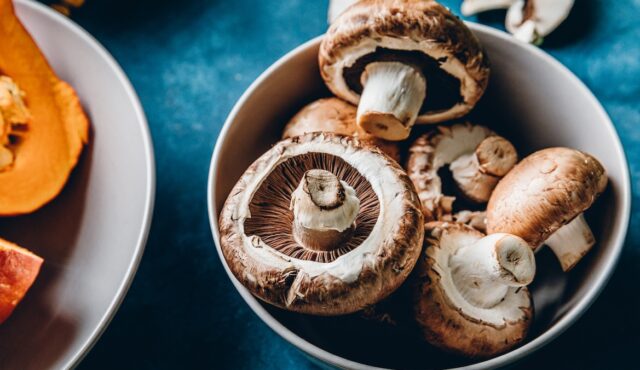To discover if eating uncooked mushrooms ultimately gets a yay or nay, we consulted Chef Sandro Falbo, culinary director at Kimpton Mas Olas, Todos Santos.
Is it safe to eat raw mushrooms?
In short, the safety of eating raw mushrooms varies by type—and a lot of guesswork can potentially be involved.
Of the 14,000 mushroom species on earth1, about 2,200 are edible and around 650 species have been studied and approved for consumption. “Mushrooms have spores that contain metals, poisons, and various other elements that come from the earth, so you really need to know about the different varieties,” says Falbo. According to a 2021 review2 in the journal PLoS One, mushrooms have a high ability to accumulate toxic substances such as mercury, lead, cadmium, and arsenic—all of which may spur the development of malignant diseases with prolonged (excessive) consumption and exposure.
Thankfully, Falbo notes that the bulk of the farmed, budget-friendly mushrooms you’ll find at the grocery store are “all quite safe to eat raw.” According to the USDA, the following mushrooms—typically available at your local grocery store—are safe to eat both raw and cooked:
- White button
- Crimini
- Portabella
- Oyster
- Shiitake
Other varieties may warrant further investigation. “Some mushrooms that can’t be eaten raw are safe to eat when cooked, but you need to know which ones as it can be very dangerous to consume mushrooms you’re unfamiliar with,” Falbo notes. For instance, he cites morel mushrooms as one type that should always be cooked before consuming.
When it comes to eating raw mushrooms, your best bet is to err on the side of caution. “Always make sure you know the vendor,” Falbo shares. If you decide to forage for your own, he advises doing so under the guidance of a trained expert who can decipher which mushrooms are edible, safe to eat raw, and/or must be cooked. “Amateurs shouldn’t be picking mushrooms on their own as there are some varieties that can be very deadly,” he warns. Have a green thumb but want to prioritize safety? You can always grow mushrooms at home with a DIY kit.
It’s always a good idea to clean your mushrooms thoroughly before consuming them, whether raw or cooked. (Pro tip: Cleaning off the dirt with a pastry brush or cloth will be sufficient and help reduce the likelihood of subjecting yourself to bland, soggy ‘shrooms post-rinsing or soaking.)
What are the benefits of eating raw mushrooms?
Mushrooms are rich in lots of important vitamins and minerals that enrich your overall health—which don’t get cooked off when eaten raw. Mushrooms are rich in selenium (which works with antioxidants to protect your body’s cells), vitamin D (key for keeping your bones strong and supporting brain health), and vitamin B6 (a metabolism superstar).
While “functional” mushrooms like reishi and chaga have gotten all the hype in the past five-plus years, regular old mushrooms also offer some surprising benefits for longevity. A 2021 review of studies from the journal Advances in Nutrition found that eating mushrooms was associated with a lower risk of total cancer3 (as well as a lower risk of breast cancer). Another study looked at data from older adults in Singapore and found that people who ate mushrooms at least twice a week had a reduced risk of mild cognitive impairment4 (a risk factor for Alzheimer’s and dementia).
Cooked vs. raw mushrooms
The healthiest way to eat mushrooms is less about cooked vs. raw and more about the method that will make them delicious enough for you to enjoy eating them.
While you can eat many common types of mushrooms raw, cooking them enhances their flavor and texture so you’re more likely to enjoy eating them. Moreover, Falbo says they’re incredibly versatile and super easy to cook. “Just [add] a little bit of onion, garlic, vegetable stock, and cream, and you’re done,” he shares. “You can eat them in salads, in sauces, as a soup, or as condiment for pasta.”
Another of the chef’s go-tos is marinating raw mushrooms—such as champignons—in lemon, olive oil, and salt, then topping them with herbs like parsley or tarragon to give them a kick. “You can eat [champignons] raw or cooked,” he continues. “It’s really a matter of preference.”
The same flexibility goes for the type of mushroom you eat and in what dishes you’d like to eat them. “I’m Italian so I love porcini and chanterelles when they’re fresh and in season. In Italy, mushroom season is one of the most important. It’s during autumn, when all the leaves turn yellow, the mushrooms begin growing all over,” Falbo shares. “Still, we leave it to the professionals to pick them.”
FAQs about raw mushroom safety
Are raw mushrooms bad for you?
The majority of farmed mushrooms you’ll find at the supermarket are safe to consume raw.
One caveat: White button mushrooms made headlines a few decades ago for the news that they naturally contain a potentially carcinogenic compound called agaritine. (Thankfully, the compound is significantly reduced through cooking5.) However, subsequent research has shown that the danger of agaritine in raw button mushrooms is pretty low; eating 4 grams a day is estimated to contribute to a fairly low lifetime cancer risk6. But if that still skeeves you out, feel free to cook them for peace of mind.
Can you eat raw mushrooms while pregnant?
Although many common types of raw mushrooms are generally safe to eat, pregnant women in particular should take care to avoid eating raw mushrooms to reduce the risk of food-borne illness or toxins.
However, cooked mushrooms can be a beneficial inclusion in a pregnancy dietary plan: One 2020 clinical trial7 found that women who ate 100 grams of white button mushrooms daily from pre-pregnancy until week 20 reduced the risk of pregnancy-induced hypertension, gestational diabetes, and preeclampsia.
Well+Good articles reference scientific, reliable, recent, robust studies to back up the information we share. You can trust us along your wellness journey.
-
Anusiya, G et al. “A review of the therapeutic and biological effects of edible and wild mushrooms.” Bioengineered vol. 12,2 (2021): 11239-11268. doi:10.1080/21655979.2021.2001183 -
Orywal, Karolina et al. “Health risk assessment of exposure to toxic elements resulting from consumption of dried wild-grown mushrooms available for sale.” PloS one vol. 16,6 e0252834. 23 Jun. 2021, doi:10.1371/journal.pone.0252834 -
Ba, Djibril M et al. “Higher Mushroom Consumption Is Associated with Lower Risk of Cancer: A Systematic Review and Meta-Analysis of Observational Studies.” Advances in nutrition (Bethesda, Md.) vol. 12,5 (2021): 1691-1704. doi:10.1093/advances/nmab015 -
Feng, Lei et al. “The Association between Mushroom Consumption and Mild Cognitive Impairment: A Community-Based Cross-Sectional Study in Singapore.” Journal of Alzheimer’s disease : JAD vol. 68,1 (2019): 197-203. doi:10.3233/JAD-180959 -
Schulzová, V et al. “Influence of storage and household processing on the agaritine content of the cultivated Agaricus mushroom.” Food additives and contaminants vol. 19,9 (2002): 853-62. doi:10.1080/02652030210156340 -
Shephard, S E et al. “Genotoxicity of agaritine in the lacI transgenic mouse mutation assay: evaluation of the health risk of mushroom consumption.” Food and chemical toxicology : an international journal published for the British Industrial Biological Research Association vol. 33,4 (1995): 257-64. doi:10.1016/0278-6915(94)00142-b -
Sun, Linlin, and Zhanjie Niu. “A mushroom diet reduced the risk of pregnancy-induced hypertension and macrosomia: a randomized clinical trial.” Food & nutrition research vol. 64 10.29219/fnr.v64.4451. 8 Jun. 2020, doi:10.29219/fnr.v64.4451










